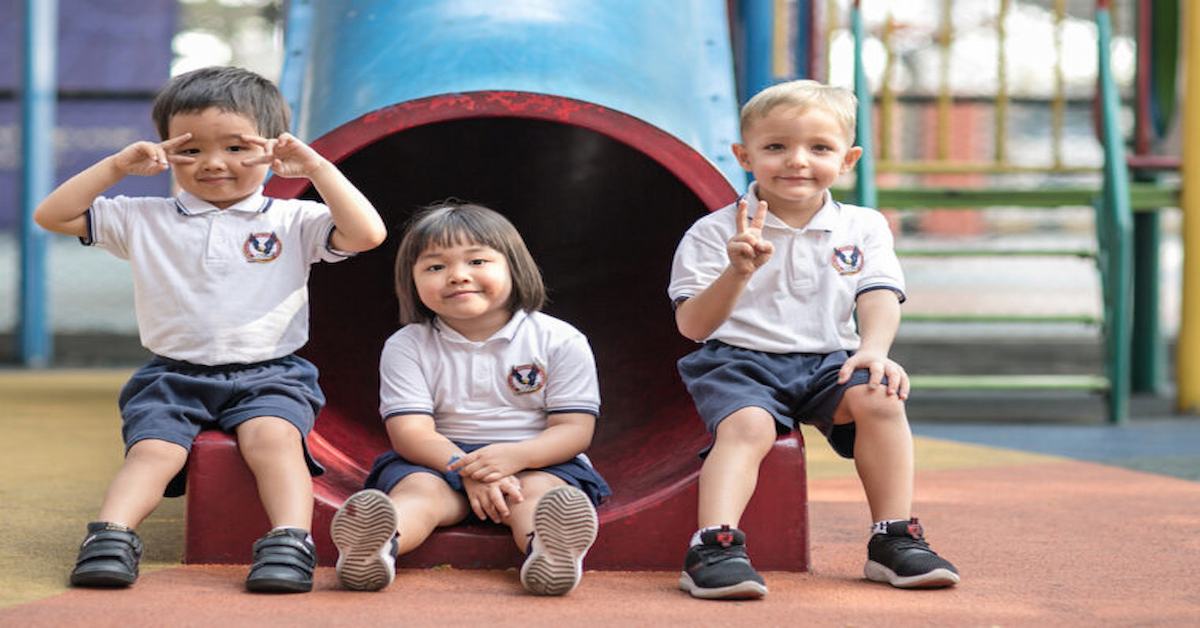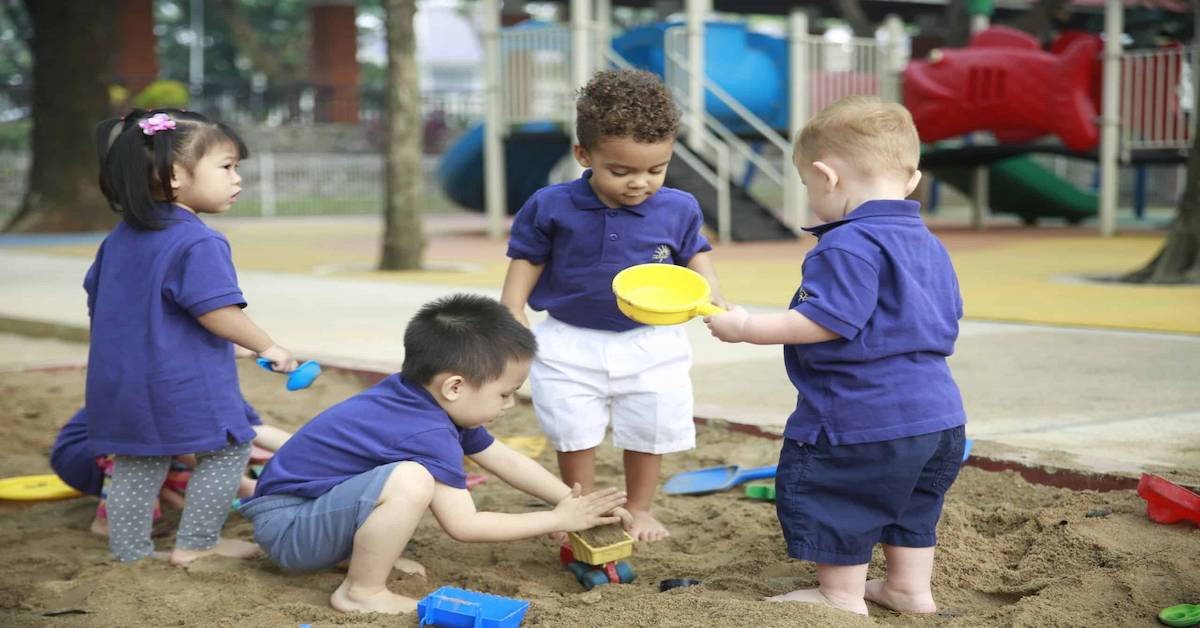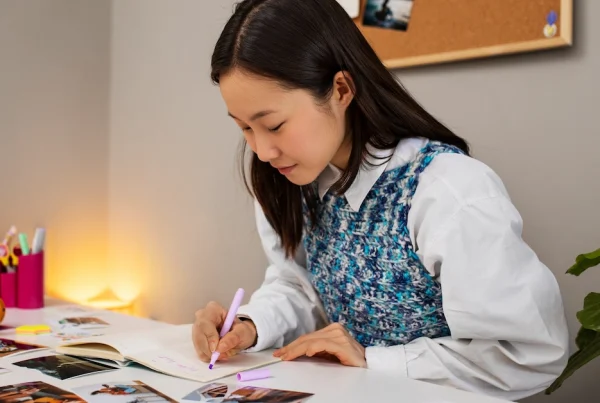“Playtime!” What is the first thought that comes to mind when you hear those words? Parents might frown whenever their kids scream for more play time, but did you know that imaginative play is one of the best ways to grow your child’s brain? In fact, research has shown that play-based learning is the most effective type of learning during early childhood development.
What Is Play-based Learning?
Play-based learning is an early childhood education approach where children are actively involved in their own learning. This method stimulates our youngest learners’ innate curiosity and provides a natural training ground to respond to their surroundings.
Children’s methods of play will develop in the course of their growth according to their preferences, abilities, and skills. Some may tend toward constructive play, like building blocks that focus on developing spatial sensitivity and motor skills. Others may prefer imaginative plays, such as a simple drama with role-play, that will help develop their creative-thinking skills.
In the end, for both types of play, these methods in a play-based learning program encourage children to be active, productive, and engaged in their lessons and the skills being taught.
Key Components of Play-Based Learning
In a play-based learning environment, adults carefully craft an atmosphere that encourages active participation from children. Here are the fundamental aspects:
- Open-Ended Discovery: Kids are encouraged to explore independently, selecting activities based on their personal interests. The environment should offer diverse options, allowing children to follow their curiosity.
- Self-Directed Exploration: Children have the freedom to choose both the activity and the way they engage in it. While adults may offer guidance or ideas, the ultimate decision-making lies with the child.
- Focus on Process: The emphasis is on the journey of play rather than achieving a predetermined outcome. There’s no right or wrong way to play; what matters is the child’s engagement in the activity.
- Enjoyable Experience: Play should be inherently enjoyable for the child. Adults shouldn’t impose specific activities; rather, they should ensure that children find pleasure in what they’re doing.
The Untold Benefits of Play-based Learning
If you haven’t been fully convinced of play-based learning, let’s take a look at the benefits of learning through play:
1. Inviting Active, Sensory Participation
Play involves the child’s senses through the acts of seeing, listening, touching, and smelling. This form of hands-on experience is effective in helping them learn and understand better. As an illustration, providing a range of materials such as sand, water, or textured fabrics for exploration encourages sensory play. Children actively use their senses to investigate the properties of these materials, enhancing both motor skills and sensory awareness.
2. Enhancing Social Skills
Learning through play also exposes children to numerous social settings that can equip them for real situations they may experience later in life. By playing with their friends, children learn to share, cooperate, express emotions, and resolve problems and conflicts. This is not only an opportunity to learn how to express themselves in correct and appropriate ways but also allows children to develop true friendships.
3. Practicing Communication and Language Skills
One of the main benefits of play-based learning is improving children’s literacy and language skills. Play-based activities help children to refine their language abilities and acquire new words. It also allows them to link written and spoken words of expression while understanding the structure and meaning of new words.
4. Increasing Creativity and Encouraging Imagination.
When children learn and play at the same time, they can unleash their creativity and imagination by obtaining new ideas and exploring them in different ways. Creating play environments that simulate real-world scenarios or fantastical settings can spark imaginative play. Whether it’s a pretend spaceship or kitchen, these environments can boost children’s creativity.
Read more: Fun and Practical Tips for Parents to Nurture Children’s Imagination
5. Inciting Curiosity and Fostering Enthusiasm
By implementing play-based learning, children will become excited learners and critical thinkers. When children have fun in their learning space, they are more likely to be interested in learning and exploring new things. Additionally, it increases the retention of new information.
6. Improving Behavior in Class
Children burn energy during physical play which helps reduce stress and enhance concentration during times they are asked to sit and focus on a task. Additionally, many play activities involve rules and boundaries. Through play, children learn to follow rules, wait their turn, and exercise self-control. These skills contribute to improved behavior in a structured classroom setting.
7. Developing Physical Skills and Learning to be Resilient
Play-based learning provides opportunities for children to develop their physical skills. Through play, children learn how to throw and catch a ball, hop on one foot, and how to balance their body. For example, children can play hopscotch. This game is a good way to combine learning with a fun game. Through hopscotch, children have the opportunity to practice counting while refining motor skills and having fun simultaneously.
8. Emotional Development
Play-based learning also offers a unique space for children to explore and develop their emotional intelligence. Through imaginative scenarios and role-playing, children can practice expressing emotions like joy, sadness, or frustration in a safe environment.
This allows them to learn healthy coping mechanisms, understand the impact of their emotions on others, and develop empathy, mirroring the compassion Jesus showed throughout his ministry. Play also fosters social skills like negotiation and conflict resolution, all contributing to a child’s emotional well-being and ability to build strong, Christ-centered relationships.
Conclusion
In conclusion, play-based learning emerges as a dynamic and effective approach in early childhood education, actively engaging children in their own learning processes. By tapping into children’s natural curiosity and adapting to their evolving interests and abilities, this method fosters diverse forms of play, from constructive to imaginative, each contributing uniquely to children’s development.
Beyond the joy it brings, play-based learning offers a plethora of benefits, including sensory engagement, social skill development, language acquisition, creativity enhancement, curiosity incitement, behavior improvement, and physical skill advancement.
The best of all is that children are learning while having fun! Parents can easily support a child’s learning at home through various activities, like reading, solving puzzles, or playing outdoors. Doing this kills two birds with one stone: you are both encouraging their learning and having fun and making childhood memories that will be cherished by our young ones forever.
Read more: The Importance of Parent Involvement in Education
Sekolah Pelita Harapan provides high-quality international preschool and kindergarten programs in Jakarta, Bogor, and Cikarang with the best learning environment for your little ones by focusing on play-based learning. From sensory plays to fine and gross motor activities, Kindergarten classes at SPH cover a wide range of different types of play that promote well-balanced development in every area: cognitive, physical, socio-emotional, and spiritual.
Every developmental stage is important, where our curriculum has been carefully designed to bring out the best of your child at every level. Our holistic approach prepares children from the earliest age to be independent learners that will surely lay a solid foundation for their future learnings, and even beyond school years.










